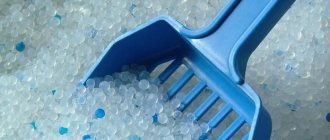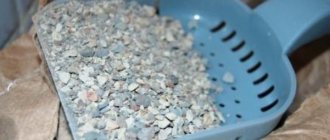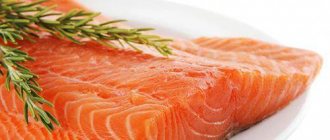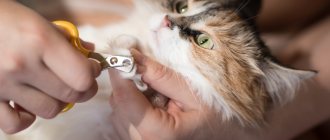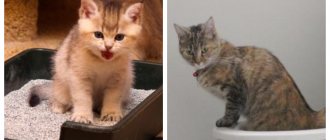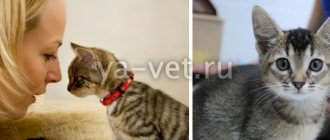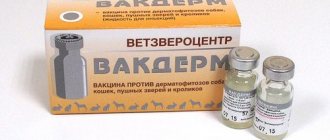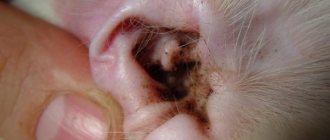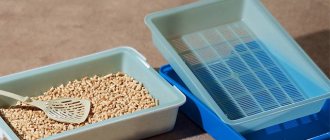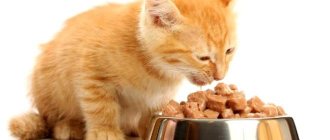Taking care of the hygiene of your four-legged pets will be made easier by using special litter for cat litter boxes. By using bentonite - cat litter, you will improve the sanitary climate of the room. Bentonite is a natural mineral with high absorbent (hydrophilic) properties.
At the same time, your beloved pet will be quite comfortable, and it will be very convenient for you to care for it. Adsorbent bentonite clay is the most effective filler in comparison with silicone, sepiolite, silica gel and wood raw materials.
Type of substance
Bentonite is a clay consisting of 70% layered highly dispersed mineral montmorillonite. The substance is one of the types of aluminosilicate, where some of the silicon ions are replaced by cations of sodium, calcium and other metals.
Additive E 558 is included in the group of emulsifiers. When diluted with water, the substance forms a viscous gel-like substance with thixotropic properties.
Based on their composition, bentonites are divided into three types:
- alkaline (the main component is exchangeable sodium cations), have a high degree of swelling and better technological properties. Rarely found in nature;
- alkaline earth (calcium cations predominate, magnesium cations predominate) with a low degree of swelling. This type is characteristic of many Russian bentonite deposits. To improve the technological qualities, the wet mineral is activated with soda ash, giving it alkaline qualities and all the advantages of sodium bentonites;
- mixed, with approximately equal ratios of sodium and calcium components, have intermediate qualities: average colloidality and dispersity.
Concrete occurs at a depth of up to 100 m; the mineral is mined using open-pit mining.
Additive E 558 is a completely natural product.
Properties
| Index | Standard values |
| Color | white with brown or gray tint |
| Compound | oxides of silicon, aluminum, impurities oxides of potassium, calcium, sodium, iron, magnesium and others; Al2O3 • 4SiO2 • nH2O |
| Appearance | powder, granules |
| Smell | absent |
| Solubility | insoluble in all basic liquids (water, ethanol, ether, acids, alkalis) |
| Main substance content | SiO2 no less than 57%, Al2O3 no less than 13% |
| Taste | absent |
| Density | from 2.66 to 2.84 g/cm3 |
| Other | high hydrophilicity, swells 16 times when hydrated; plastic; resistant to chemical acids; has the ability to self-disperse |
Benefits of Bentonite Cat Litters
The convenience of fillers made from bentonite raw materials is to use one pour into a tray and then remove it in portions with a spatula over a long period of time.
You can buy toilet filler in various fractions. For cats of different breeds and different types of trays, you should choose the most convenient and comfortable option.
The product can be ordered in the BSV-BENT online store in Kyiv. The range of this product segment of the BSV-BENT company is certified. It has a different fraction of granules (up to 0.7 mm; 0.7 - 5.0 mm).
Clay compositions can be activated, which allows the filler to “clump” or “not clump.”
Application
Additive E 558 is approved for use in the food industry as an emulsifier, carrier, drying agent, and anti-caking agent. The substance is included in the production technology of fat-and-oil and starch products.
The high adsorbing properties of bentonite, environmental friendliness and safety for health have made it possible to widely use the product for winemaking needs (OST 18-49-71).
Emulsifier E 558 is used:
- for clarification and purification of white grape must from waste yeast, tartar and other sediments - the causes of the formation of protein turbidity;
- for stabilization of wine materials, including for the production of champagne and sparkling wines;
- for clarification of fruit and berry juices.
Bentonite binds unwanted components to form an easily removable dense sediment.
The disadvantages of the E 558 additive include large losses of wine due to the high swelling of the substance and the formation of a large amount of sediment. This especially applies to sodium bentonites. In some cases, the problem is solved by adding synthetic flocculants (for example, polyoxyethylene). They increase the rate of deposition of foreign substances.
Bentonite is popular among home winemakers. It is used to clean, clarify and stabilize mash, and remove unwanted odors. The substance dissolves easily in liquid without forming lumps.
Additive E 558 called “wine bentonite” is sold in specialized stores. If the required product is not available, experienced winemakers advise replacing it with... bentonite cat litter (without flavorings!).
Natural eco-friendly mineral is considered one of the best fillers:
- safe for the animal;
- perfectly absorbs moisture and retains odor;
- economical: forms a strong lump, which is removed from the total mass.
The filler has one drawback: it cannot be disposed of through the toilet.
Swollen granules will cause sewer pipes to clog. One of the main consumers of the E 558 additive is the cosmetics industry.
Bentonite clay is used in the production of emulsion creams, lipsticks, masks and other cosmetics. The substance improves the texture of products and retains the aroma for a long time.
The additive is used to care for the skin of the face and body; it is used to make cosmetic wraps and mud baths.
An important quality of bentonite is that upon contact with the skin it influences biochemical reactions at the cellular level. The substance promotes:
- normalization of metabolic processes in tissues;
- accelerating collagen production;
- restoration of the sebaceous glands.
Cosmetics based on the emulsifier E 558 have a tonic, cleansing, anti-inflammatory, and rejuvenating effect. When using products, it is important to observe moderation: prolonged use of bentonite dries out the skin.
Interesting! Bentonite is sometimes called blue clay. Despite similar properties and similar chemical composition, these are different substances. Blue clay is a product of rock decay, while bentonite is volcanic ash. These are particles of magma flying out of a volcano.
The unique adsorbing qualities of the additive are actively used by medicine. Bentonite is used in the treatment of a wide range of diseases:
- poisoning, the substance binds and removes mercury, arsenic, hydrocyanic acid, and heavy metal salts from the body;
- helminthic infestation (included as a filler in the antigen composition);
- Gastrointestinal diseases: relieves pain, normalizes acid-base balance, eliminates flatulence, bloating;
- dermatological problems (psoriasis, trophic ulcers, radiation damage to the skin): clay-based paste promotes rapid healing of wounds, eliminates swelling and itching;
- allergies of various etymologies;
- joint diseases.
Additive E 558 is used for drilling operations in floating and loose soils. Bentonite clay is used to strengthen the bore. The astringent properties of the substance make it possible to prevent the walls of trenches from collapsing, especially if drilling is carried out below the groundwater level. Upon completion of the work, the bentonite solution hardens. This additionally creates a waterproof barrier.
The product also acts as a lubricant, preventing soil particles from sticking to the drilling tools. This extends the service life of the installations.
Bentonite plays an important role in livestock and agriculture. Additive E 558 is included in wet food and granular mixtures. It promotes the digestibility of food, increases the weight of animals, increases milk yield, and improves the quality of wool in sheep.
The substance is used for granulating seed material and is used to clean soil from toxic impurities (petroleum products, resins, heavy metals).
A starch substitute is made based on the emulsifier E 558. It is used for processing fabrics.
Concrete is allowed in all countries. The permissible dose has not been established.
Brands of toilet mixtures
Sand of the “Pi-Pi Bent Classic” brand has these properties.
Many types of bentonite toilet composition have been developed. They differ in the size of the granules. Bentonite can be neutral or have an easily perceptible herbal odor. In addition, a filler has been produced that contains bentonite clay and wood inclusions. Some of the most common toilet mixtures are the following brands:
- Biokat's;
- Fussie Cat;
- Pi-Pi-Bent Classic;
- "Sea Sea Cat";
- "Clean paws";
- PrettyCat.
Owners select a filler that is convenient for cleaning. It is also important that the cat likes it, because often the animal may avoid going to the toilet due to the size of the granules or their composition. The safety of the components is also considered important. It is possible for your pet to develop allergic reactions, as some fillers contain allergens. They can harm your pet's body.
Benefits and harms
Additive E 558 is safe for health. Only inhalation of bentonite powder dust can cause relative harm (irritation of the upper respiratory tract, cough).
Bentonite benefits the body as an effective sorbent . The substance cleanses the intestines, removes toxins, and improves overall well-being.
Calcium silicate (E552) is often used in the production of salt to prevent caking and clumping.
What is magnesium hydroxide and where is it used? We talked about this in detail here.
Currently, sandalwood is not used as a dietary supplement. Why - read our article.
Main manufacturers
In Russia, the production of the E 558 additive is carried out by the Bentonite Company LLC holding, which includes the following enterprises:
- LLC "Bentonite Khakassia" (city of Chernogorsk);
- LLC "Bentonite Kurgana";
- JV "AzRosPromInvest" (Azerbaijan);
- Glinopererabotka LLC (Bryansk) produces granules for cat litter.
Leading global manufacturers:
- Bassermann minerals GmbH & Co.KG (Germany);
- Qualimet GmbH (Switzerland);
- Pointner & Rothschädl GesmbH (Austria).
Interesting fact! The development of bentonite deposits raises concerns among environmentalists: the quarry method of extracting the mineral destroys vegetation and disrupts the biological balance. The German company Gimborn (the company produces cat litter) came up with an interesting way out of the situation. Employees regularly plant hundreds of trees in the sites of already developed quarries.
What to do if a kitten eats bentonite?
Quite often a situation arises when a kitten begins to eat bentonite granules. Do not allow these actions, grains can cause intestinal blockage. If you see that the kitten has become lethargic, sleepy, has lost its appetite and other signs of poisoning have appeared, immediately take your pet to the veterinarian and be sure to take with you a handful of litter and its packaging to show the specialist what caused the kitten’s condition.
To avoid this situation in the future, try teaching your kitten to go to the toilet on a grate. That is, pour bentonite onto the bottom and place a grate on top. This way, dangerous pebbles will be hidden from the cat child. In addition, this method will save the apartment from the spread of grains, because now the kitten will not touch the filler with its paws.
The only negative is that solid waste will not be buried, but a responsible owner always clears the tray of feces in a timely manner.
The reason for this behavior of the kitten may be improper feeding. The pet's diet must be balanced and supplemented with vitamins. It is best to consult a veterinarian. Let a specialist recommend how to properly feed a particular animal depending on its age, size, breed, and health status. If the kitten does not experience a deficiency of any substances in its body, then, most likely, it will not be interested in bentonite granules.
For a review of the Muffin clumping bentonite cat litter, see below.
